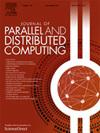Towards value-sensitive and poisoning-proof model aggregation for federated learning on heterogeneous data
IF 3.4
3区 计算机科学
Q1 COMPUTER SCIENCE, THEORY & METHODS
引用次数: 0
Abstract
Federated Learning (FL) enables collaborative model training without sharing data, but traditional static averaging of local updates leads to poor performance on heterogeneous data. The following remedies, either by scheduling data distribution or mitigating local discrepancies, predominately fail to handle fine-grained heterogeneity (e.g., local imbalanced labels). To commence, we reveal that static averaging leads to the global model suffering from the mean fallacy. That is, the averaging process favors the local model with large parameters numerically rather than knowledge. To tackle this, we introduce FedVSA, a simple-yet-effective model aggregation framework sensitive to heterogeneous local data merits. Specifically, we invent a new global loss function for FL by prioritizing the valuable local updates, facilitating efficient convergence. We deduce a softmax-based aggregation rule and prove its convergence property via rigorous theoretical analysis. Additionally, we expose poisoning threats of model replacement that utilize the mean fallacy for attacks. To mitigate this threat, we propose a two-step mechanism involving auditing historic local training statistics and analyzing the Shapley Value. Through extensive experiments, we show that FedVSA achieves faster convergence (~1.52×) and higher accuracy (~1.6%) compared to the baselines. It also effectively mitigates poisoning attacks by agilely recovering and returning to normal aggregation.
为异构数据联合学习实现价值敏感和防中毒的模型聚合
联合学习(FL)可以在不共享数据的情况下进行协作模型训练,但传统的局部更新静态平均化会导致异构数据性能不佳。以下的补救措施,无论是通过调度数据分布还是缓解局部差异,主要都无法处理细粒度的异质性(如局部不平衡标签)。首先,我们发现静态平均会导致全局模型出现均值谬误。也就是说,平均过程在数值上偏向于参数较大的局部模型,而不是知识。为了解决这个问题,我们引入了 FedVSA,这是一个简单而有效的模型聚合框架,对异构的本地数据优点非常敏感。具体来说,我们通过优先考虑有价值的本地更新,为 FL 发明了一种新的全局损失函数,从而促进了高效收敛。我们推导出一种基于 softmax 的聚合规则,并通过严谨的理论分析证明了其收敛特性。此外,我们还揭露了利用均值谬误进行攻击的模型替换中毒威胁。为了减轻这种威胁,我们提出了一种两步机制,包括审核历史局部训练统计数据和分析 Shapley 值。通过大量实验,我们发现与基线相比,FedVSA 的收敛速度更快(约为 1.52 倍),准确率更高(约为 1.6%)。它还能通过敏捷恢复和返回正常聚合来有效缓解中毒攻击。
本文章由计算机程序翻译,如有差异,请以英文原文为准。
求助全文
约1分钟内获得全文
求助全文
来源期刊

Journal of Parallel and Distributed Computing
工程技术-计算机:理论方法
CiteScore
10.30
自引率
2.60%
发文量
172
审稿时长
12 months
期刊介绍:
This international journal is directed to researchers, engineers, educators, managers, programmers, and users of computers who have particular interests in parallel processing and/or distributed computing.
The Journal of Parallel and Distributed Computing publishes original research papers and timely review articles on the theory, design, evaluation, and use of parallel and/or distributed computing systems. The journal also features special issues on these topics; again covering the full range from the design to the use of our targeted systems.
 求助内容:
求助内容: 应助结果提醒方式:
应助结果提醒方式:


